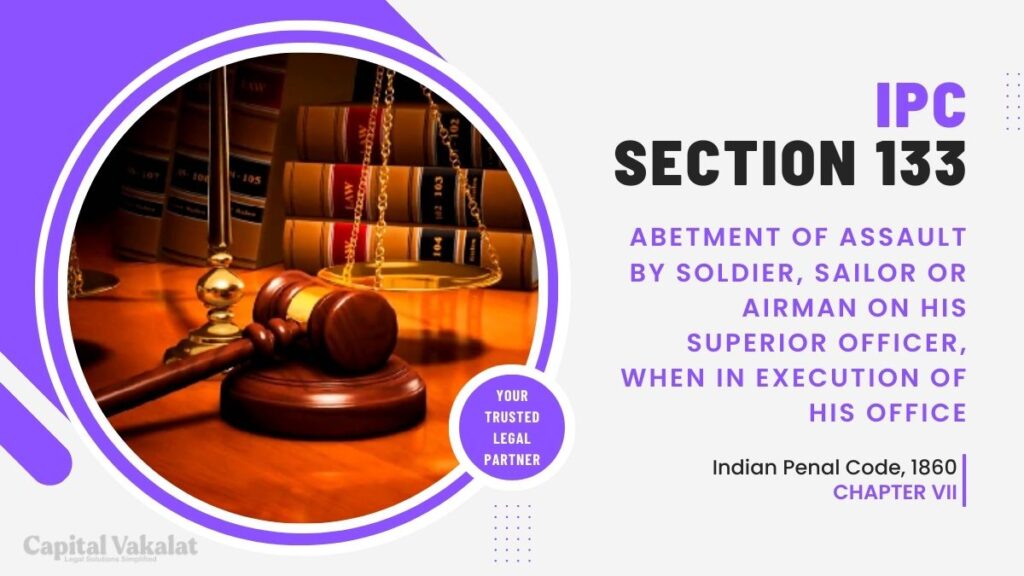In the realm of criminal law, Section 133 of the Indian Penal Code (IPC) addresses the abetment of assault by a soldier, sailor, or airman on their superior officer while in the execution of their official duties. This legal provision holds a significant place in the military and defense sector, outlining the consequences for those who incite or support such acts.

This article will delve into the intricacies of Section 133 IPC, exploring its implications, elements, and legal nuances.
Understanding Section 133 of IPC
Section 133 IPC deals with situations where a soldier, sailor, or airman is incited or abetted to assault his superior officer while performing his official duties. This section primarily targets the internal discipline and order within the military and defense forces.
Abetment in Criminal Law
Before diving deeper into Section 133, it’s essential to grasp the concept of abetment in criminal law. Abetment refers to instigating, engaging, or aiding another person to commit a crime. In this context, it involves encouraging a military personnel to assault his superior officer, which is a criminal act.
The Offense of Abetment
Abetting an assault is considered a grave offense. It not only threatens the safety and order within the armed forces but also undermines the principles of discipline and hierarchy crucial in such environments.
Abetment of Assault by a Military Personnel
Section 133 IPC is explicitly tailored to military and defense settings. It addresses situations where an individual, either within or outside the military, encourages a soldier, sailor, or airman to assault his superior officer while the latter is discharging his official duties.
Key Elements of Section 133 IPC
For an offense to fall under Section 133, the following key elements must be present:
- The accused abetted an assault by a soldier, sailor, or airman.
- The assault was committed on the accused’s superior officer.
- The assault occurred while the superior officer was in the execution of his official duties.
Punishments Under Section 133
Section 133 IPC prescribes punishments for those found guilty of abetting such assaults. The penalties may include imprisonment, fines, or both, depending on the severity of the crime and the specific circumstances of the case.
Legal Provisions for Protection
While Section 133 IPC addresses the offense and its consequences, there are also legal provisions to protect individuals from false accusations. The law acknowledges the importance of evidence and due process to ensure justice is served.
Recent Cases
Several recent cases have brought Section 133 IPC into the spotlight, highlighting the complexities in prosecuting abetment of assault by military personnel. These cases shed light on the challenges and debates surrounding the application of this legal provision.
Challenges in Prosecution
The successful prosecution of cases under Section 133 IPC can be challenging. It requires clear evidence of abetment, the assault, and the official duties being performed at the time. Proving these elements beyond a reasonable doubt can be a daunting task.
Conclusion
Section 133 IPC plays a pivotal role in maintaining discipline and order within the military and defense forces. It serves as a deterrent against the abetment of assaults on superior officers while in the execution of their official duties. Understanding the nuances of this provision is crucial, both for those serving in the armed forces and for the legal system.
This article provides an overview of Section 133 IPC, shedding light on its importance in upholding discipline and order within the military and defense forces. It is crucial for those in the armed forces and legal practitioners to comprehend the intricacies of this legal provision to ensure justice is served while maintaining the chain of command and order.
FAQs
Who is considered a superior officer in this context?
A superior officer is typically a higher-ranking military personnel responsible for giving orders and maintaining discipline within the armed forces.
Can a civilian be charged under this section?
Yes, if a civilian is found to have abetted an assault by a military person on a superior officer, they can be charged under Section 133 IPC.
How is abetment proven in court?
Abetment is proven in court through the presentation of evidence that demonstrates the accused’s active encouragement or support for the assault.
Are there any defenses available to the accused?
Defenses may include lack of evidence, mistaken identity, or proving that the accused had no intention to abet the assault. The specific defense strategy may vary from case to case.